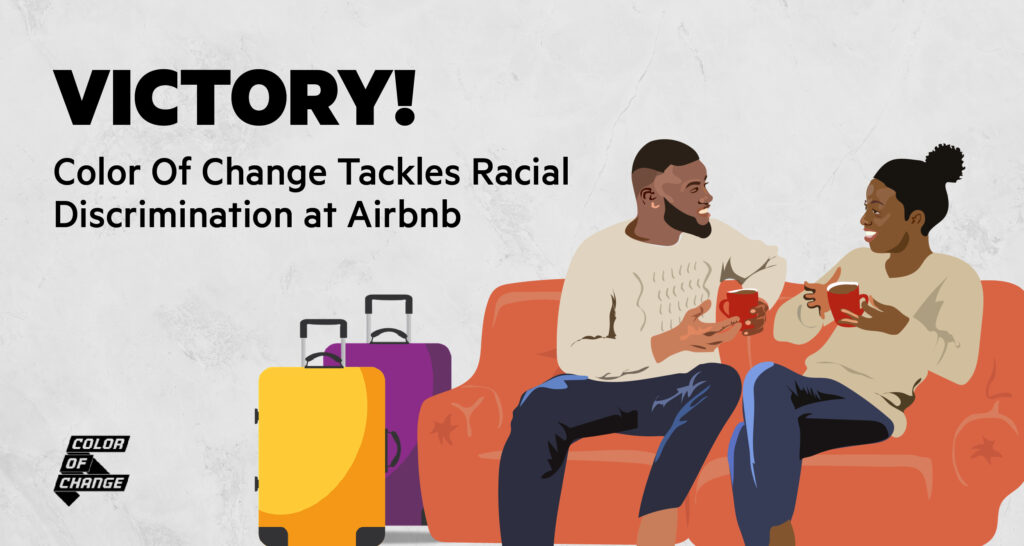COC Partnership Helps Airbnb Formulate Anti-Discrimination Plans

By Color Of Change staff
When travelers use the online booking site Airbnb for their next vacation getaway, they won’t find rental listings for slave cabins on former antebellum plantations.
Black and Latino travelers also will find it easier to receive a review as a guest — the lack of which has hampered them from booking places to stay using the website.
The changes, announced in mid-December, are the result of Project Lighthouse, a high-profile initiative Color Of Change helped design that Airbnb is using to root out racial discrimination, bias and other harmful practices.
Advocates are calling the changes “real progress” toward eliminating discrimination against Black and brown travelers. Evan Feeney, deputy senior campaign director with Color Of Change’s Corporate Accountability Team, said the ban on slave quarters as vacation rentals “makes sure that folks trying to profit off the history of exploitation of Black folks is significantly hampered.”
“No one should be going to spend a joyous, light-hearted vacation inside a former slave cabin. Just the thought of that is horrific,” Feeney said. The change “will ensure that Black people do not inadvertently stay at places where their ancestors were enslaved and harmed.”
The new policy also prohibits hosts from promoting “slavery-related features” to attract vacationers to book their property. A company representative said in December the policy led to the removal of at least 30 listings from the site, adding that Airbnb “will continue to evaluate cases as they arise.”
Feeney said many of the hosts offering homes linked to slavery are “whitewashing” the brutal history of their properties.
“It’s like, ‘Pay no mind to the atrocities that happened here for hundreds of years. Just enjoy the architecture and Southern hospitality,’ ” said Feeney.
Airbnb officials acknowledge there’s more work ahead. The latest Project Lighthouse report, also released in December, found that Airbnb users perceived to be Black were rejected for booking requests at a significantly higher rate than users perceived to be white.
Janaye Ingram, Airbnb’s director of community partners programs and engagement, told CNN that the differential is “unacceptable,” a situation her company is “doing a lot to address.”
Those changes have been long in coming. In 2016, Color Of Change and its members pressured Airbnb to conduct a racial equity audit after a number of Black renters complained about bias and discrimination while using the service. A 2015 Harvard University study supported their complaints. It found that Airbnb hosts were less likely to rent to guests with names that sounded Black.
“You cannot fix bias without measuring it first,” Brian Chesky, Airbnb co-founder and CEO, said in 2020 at the launch of Project Lighthouse. He lauded the company’s collaboration with Color Of Change, along with support and input from a half dozen other civil rights organizations, including the NAACP.
Chesky said Color Of Change helped the company “take this work to the next level – to help us understand fully when discrimination occurs, how unconscious bias is manifested on the platform and the effectiveness of our policies.”
Since the partnership began in 2016, Airbnb has taken a number of steps to address discrimination, including allowing hosts to see a guest’s profile picture only after they accept the booking. The company also has made it easier for renters to bypass a host’s approval of a reservation request, and it is also auditing why reservations are rejected, looking for evidence of bias.
Feeney said Project Lighthouse is a major COC win. It’s rare, he said, for a major tech company to undertake a transparent process to try to end discrimination — studying and quantifying it on their platform, then drawing up plans to tackle it.
“This was not just some side project,” Feeney said. “Too many companies are too scared to examine the question of ‘Is our product causing harm?’ Most companies just want to look at their DEI or their hiring policies, like ‘Are we bringing on enough Black staff? Does this department have enough diversity?’”
But “representation is not going to change the harms these tech companies are causing our communities,” Feeney said.
Rashad Robinson, president of Color Of Change, said Airbnb “has shown tech companies what’s possible when racial justice is centered in their policies and business practices.”
The Project Lighthouse report, he said, “underscores what we already know to be true: That racial equity audits drive results when the issues exposed are addressed with urgency, resources and full buy-in from company leadership.”
Feeney said the “staying power” of Color Of Change’s membership makes a difference.
“We’re not just making a demand and leaving, moving on to the next thing,” Feeney said. “When we see the opportunity, we’ll sit down to cultivate meaningful work that we think moves not just a single company forward, but an entire sector forward.”

